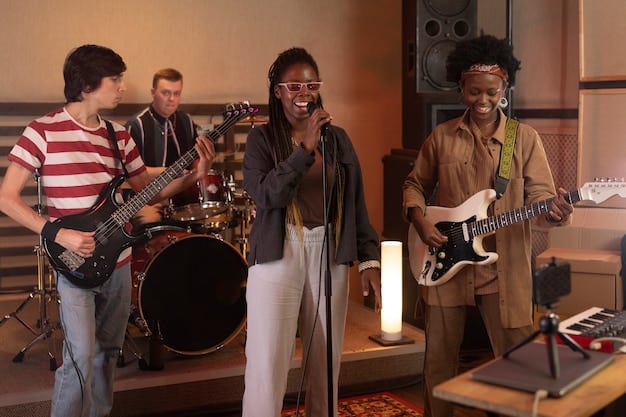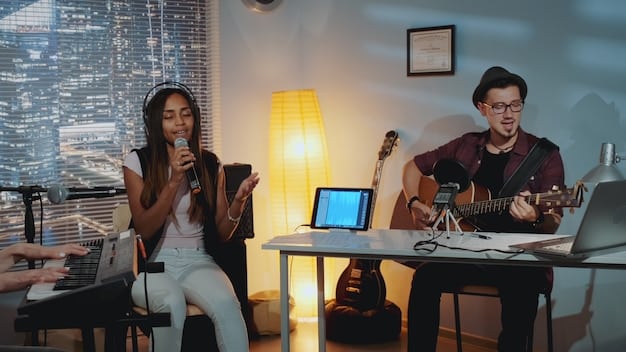The Power of Music Collaboration: Expand Your Reach as a Musician

Advertisements
The power of collaboration in music provides musicians with opportunities to broaden their audience, explore new creative territories, and develop skills through shared experiences, ultimately leading to more impactful and enriching musical endeavors.
The music industry can often feel like a solitary journey, but it doesn’t have to be! Embracing the power of collaboration can unlock new creative avenues, expand your audience, and inject fresh energy into your musical projects. Let’s explore how to find and work effectively with other musicians to elevate your career.
Understanding the Benefits of Musical Collaboration
Collaborating with other musicians is more than just making music together; it’s a strategic move that can significantly enhance your career. From expanding your reach to fostering creativity, the advantages are numerous.
Expanding Your Reach and Audience
One of the most tangible benefits of collaboration is the potential to tap into a new audience. When you work with another musician, you’re essentially combining your fan bases.
Boosting Creativity and Innovation
Collaborations can be a catalyst for innovation. Working alongside another musician can expose you to new techniques, styles, and perspectives.
- Gain access to a new audience base.
- Benefit from cross-promotion opportunities.
- Increase your visibility in different musical circles.
By combining your strengths and resources, you can create opportunities that might have been out of reach on your own. This strategic approach to collaboration can significantly boost your visibility and open doors that were previously closed.

Identifying Potential Collaborators
Finding the right collaborators is crucial for a successful musical partnership. It’s not just about musical talent; it’s about finding someone whose vision and work ethic align with yours.
Networking at Music Events and Online Communities
Attending local gigs, music festivals, and industry events is a great way to meet potential collaborators. Online, platforms like music forums, social media groups, and dedicated collaboration websites can connect you with like-minded musicians.
Assessing Compatibility and Shared Goals
Before diving into a project, take the time to assess whether your musical styles, goals, and work ethics align. A successful collaboration requires mutual respect, clear communication, and a shared vision for the project.
- Look for musicians with complementary skills.
- Attend local music events to network.
- Join online music communities to find collaborators.
Finding fellow musicians who share a similar passion for music can lead to creative synergies and opportunities that propel artistic growth. These partnerships can drive inspiration, and lead to the creation of music that exceeds individual capabilities
Defining Roles and Responsibilities
Once you’ve found a suitable collaborator, it’s essential to define roles and responsibilities clearly. This will help prevent misunderstandings and ensure that the project runs smoothly.
Setting Clear Expectations and Boundaries
Discuss your expectations upfront regarding creative input, workload, and timelines. Establishing clear boundaries will help maintain a healthy working relationship throughout the collaboration.
Establishing a Contract or Agreement
Consider creating a simple contract or agreement that outlines each member’s responsibilities, ownership of the music, and how royalties or profits will be split. This protects everyone’s interests and provides a framework for resolving any disputes that may arise.
- Clearly list each person’s responsibilities.
- Establish fair splits for royalties and profits.
- Create a simple written agreement.
By setting clear expectations and boundaries, all collaborators will feel heard and know what role needs to be fulfilled. This, in return, creates less stress and can make collaboration that much more enjoyable.
Effective Communication and Feedback
Open and honest communication is the backbone of any successful collaboration. Being able to give and receive feedback constructively is crucial for creating the best possible music.
Providing Constructive Criticism
Frame your feedback in a positive and helpful manner, focusing on the music rather than personal attacks. Offer specific suggestions and solutions, and always be respectful of your collaborator’s creative vision.
Utilizing Online Collaboration Tools
There are numerous online tools available that can facilitate communication and collaboration, such as cloud storage for sharing files, project management software for tracking progress, and video conferencing for virtual meetings. Services like Google Drive, Trello, and Zoom can be invaluable.

- Use positive language when giving feedback.
- Offer specific and actionable suggestions.
- Utilize online tools for easy communication.
Effective communication and feedback help create a positive atmosphere, which makes it much easier for collaboration to be as successful as possible.
Promoting Your Collaborative Work
Once you’ve created your music, promoting it effectively is essential to reaching as wide an audience as possible. Coordinated marketing efforts can amplify the impact of your collaboration.
Coordinated Marketing Strategies
Develop a marketing strategy that leverages both collaborators’ networks and platforms. Coordinate your social media posts, email campaigns, and press releases to create a cohesive promotional push.
Cross-Promotion on Social Media
Encourage both collaborators to share the music on their social media channels, tagging each other and using relevant hashtags. This cross-promotion will expose your music to a wider audience and drive engagement.
- Develop a joint marketing plan.
- Coordinate social media posts.
- Leverage both collaborators’ networks.
This can help you grow your individual audiences and foster a lasting relationship with a new group of fans. A collaborative release also provides more content and opportunities for engagement, ensuring mutual benefits.
Navigating Challenges and Conflicts
Even in the best collaborations, challenges and conflicts can arise. The key is to address them proactively and find solutions that work for both parties.
Addressing Creative Differences
If you and your collaborator have different ideas about the direction of the music, try to find a compromise that incorporates both visions. Be open to experimentation and willing to step outside of your comfort zone.
Dealing with Disputes and Misunderstandings
If a dispute arises, address it promptly and calmly. Listen to your collaborator’s perspective, and try to find a mutually agreeable solution. If necessary, consider bringing in a neutral third party to mediate.
- Listen to each other’s perspectives.
- Compromise when necessary.
- Seek mediation if disputes arise.
Ultimately, maintaining a respectful relationship will enhance the collaborative energy and lead to more successful outcomes. By being thoughtful and considerate, the group can resolve issues efficiently and continue to innovate creatively together.
| Key Point | Brief Description |
|---|---|
| 🤝 Finding Collaborators | Network at gigs and online to find musically compatible partners. |
| ✍️ Define Roles | Establish clear responsibilities and agreements for each member. |
| 🗣️ Communicate Openly | Give and receive feedback constructively for mutual growth. |
| 🚀 Promote Jointly | Cross-promote to maximize visibility and audience reach. |
FAQ
▼
Attend local music events, join online music communities, and reach out to musicians whose work you admire. Platforms like Bandmix and social media groups tailored for musicians are also great resources.
▼
Include details like each member’s responsibilities, ownership of the music, how royalties or profits will be split, and the process for resolving disputes to ensure clarity and protect everyone’s interests.
▼
Be open to compromise, listen to your collaborator’s ideas, and be willing to experiment. Finding a middle ground that respects both visions often leads to innovative and unique outcomes in music.
▼
Use tools like Google Drive for file sharing, Trello for project management, and Zoom for virtual meetings. These platforms can help streamline communication and keep your collaboration organized remotely.
▼
Develop a joint marketing strategy, coordinate social media posts, and leverage both collaborators’ networks. This cross-promotion will maximize exposure and drive engagement across various platforms and audiences.
Conclusion
Embracing the power of collaboration as a musician opens doors to creativity and expands reach. By finding the right collaborators, setting clear roles, communicating effectively, and navigating challenges proactively, you can elevate your musical journey and achieve shared success.





